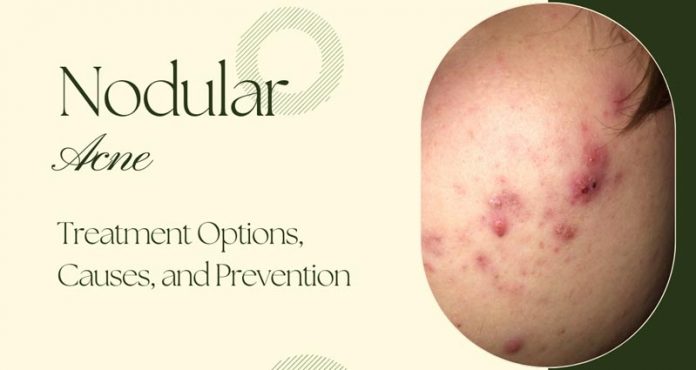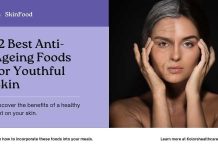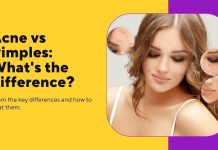Nodulocystic acne is a severe type of acne that is painful and found below your skin surface. With aggressive treatment and medication, it is possible to control these nodules. It would help if you approached a healthcare professional to discuss the treatment options to prevent acne breakouts. As the risk of recurrence of nodular acne and scarring is high, you need to have patience and complete the prescribed treatment as prescribed to get relief (1).
What Is Nodulocystic Acne?
Nodulocystic acne or nodular acne is a severe and painful type of inflammatory acne that might affect deep layers of your skin (2). They appear like raised bumps in red or skin color and are tender to the touch. Unlike your regular acne, these nodules cannot be popped. Instead, the impurities stay trapped within your skin, making it feel like a thick lump and leading to inflammation, discomfort, and redness. It forms when the pores of your skin become clogged with trapped bacteria, sebum, and impurities. This skin condition usually affects teenagers as soon as they enter puberty and reduces slowly as they grow into adolescents. However, some people continue to deal with acne even in their 50s due to hormonal changes or medicinal side effects.
Characteristics of Nodular Acne
Nodular acne can be easily identified through the following characteristics:
- Firm bumps beneath the skin in pink or red color
- Presence of huge-sized cysts and lesions with inflammation
- The absence of blackheads or whiteheads in the core earned it the name “blind pimple”
- A small bump developed into a large hard lump with severe pain
Locations On the Body Where Nodular Acne Is Commonly Found
These firm acne nodules that can be felt under the skin surface are found in the following areas in your body.
- Teenage Girls and Women: Nodular acne usually appears on the chin region, face, and along the jawline.
- Teenage Boys and Men: Nodular acne generally occurs on the chest, back, and face of males.
What Causes Nodular Acne?
Anyone can develop nodular acne, and the cause might differ from one individual to another (3). This acne can be caused by one or more of the following reasons.
1. Blocked Skin Pores
Your skin pores can get blocked if you don’t exfoliate or cleanse regularly, as it removes the excess sebum produced naturally. This severe form of acne develops when the skin pores are blocked while trapping the sebum, hair, and dead skin cells. The clogged skin pores also trap the C. acnes bacteria that reside on your skin, leading to severe pain, infection, and inflammation.
2. Too Much Sweating
If you tend to sweat excessively, your skin is more prone to developing nodular acne. If your work demands you wear clothing that doesn’t absorb sweat, it increases the risk of developing these nodules. In addition, people suffering from a medical condition called hyperhidrosis with the symptom of excessive sweating have a higher chance of developing this skin condition.
3. Genetics
If any of your family members has nodulocystic acne, it increases your risk of developing it. If any one of your parents or siblings suffers from acne nodules, then the chances of your developing it are very high (4).
4. Specific Medications
Some specific ingredients can trigger nodular acne if you take medications to treat some medical conditions. For example, anticonvulsants containing phenytoin, lithium, corticosteroids, and more can worsen your acne.
5. Changes in Hormone
Teenage kids going through puberty are prone to nodular acne due to the change in their hormone levels. In adolescent boys, the androgen hormone levels increase rapidly, altering the natural composition of sebum produced by your skin and making it thicker to clog the skin pores. These clogged pores create a perfect environment for the C. acnes bacteria to thrive. Menstruating females, pregnant women, and people going through menopause may also develop nodular acne.
6. Other Factors
Makeup products and cosmetic items like body lotion or face creams can also clog the skin pores to cause nodules. In addition, high anxiety or stress levels hike the sebum secretion levels, which in turn triggers the production of the cortisol stress hormone, leading to nodular acne.
How Long Do Nodules Last?
Being persistent, this type of acne can take much time to heal. Nodular acne can remain unchanged for several weeks to months, which is why over-the-counter medicines will not get rid of it. Even with professional treatment, these nodules can last for several weeks and leave a scar (5). However, resist the urge to pop or pick it, as it can increase the severity of the skin condition (6).
Nodular Acne Vs Cystic Acne
Both cystic acne and nodular acne are severe types of acne. Often, people confuse the two as they develop under the deep skin layers.
- Appearance: Cystic acne looks like a large boil in red color. Like their nodule counterparts, cysts are found underneath the surface of your skin. As they are filled with pus, cystic acne is soft to the touch compared to nodular acne. Cystic acne pops open and causes infection on the site. It develops when the whiteheads and blackheads spread to several areas of the skin. Nodular acne is also pinkish-red in color and does not have pus inside. Unlike cystic acne, nodular acne cannot be popped open and are very painful.
- Persistence Level: Cystic acne can be cleared up by applying topical antibiotic creams or gels of prescription strength to eliminate bacteria and relieve inflammation. Nodular acne lasts for several weeks or months as the contents in it harden down and turn into hard lumps.
Treatment Options for Nodular Acne
If your nodular acne is persistent, inflamed, and causes severe pain, indirectly affecting your mental health, visit your dermatologist immediately. Any of the following treatments would be advised by your dermatologist to prevent acne breakouts further and to relieve the symptoms.
- Topical Medications: Prescription-strength topical medications with higher concentrations are effective only if you have a few acne nodules.
- Oral Antibiotics: If your nodules keep recurring or if you have widespread nodule cysts, then your doctor would prescribe oral antibiotics to curb the effect of Propionibacterium. These drugs will help lower inflammation and pain and help your pores open up.
- Vitamin derivative: Your dermatologist may suggest Isotretinoin, a derivative of Vitamin A, as a part of your nodule treatment. However, these medications will begin to show results after a few months of regular intake. If you are a woman, your doctor might prescribe birth control pills to regulate the hormone cycle.
- Other Procedures: Based on the severity of nodular acne, procedures like chemical peels, acne extraction or draining, blue light therapy, or laser therapy may also help treat it and deal with the scars.
Prevention of Nodular Acne
- Follow skincare routine regularly
- Clean the affected site twice a day
- Use a mild cleanser with a non-abrasive formula
- Avoid scrubbing
- Use sunscreen with high SPF
Conclusion
Nodular acne can spread quickly if ignored and damage your skin by causing lumps, pigments, and scars. Visit your dermatologist to treat it immediately, as it would help fast your recovery route. Even if you experience slight pain or inflammation, seeking professional help is imperative to maintain scar-free and clear skin.
References
- Therapeutic Considerations for Severe Nodular Acne. Am J Clin Dermatol 12, 7–14 (2011) – https://link.springer.com/article/10.2165/11532280-000000000-00000
- J Ayer, Faculty of Medicine, Imperial College London, London, UK – https://www.ncbi.nlm.nih.gov/pmc/articles/PMC2585707/
- Department of Surgery and Translational Medicine, University of Florence Florence, Italy – https://pubmed.ncbi.nlm.nih.gov/25876146/
- https://f1000research.com/articles/9-792/v1
- Lutfi Al-Kathiri and Tasneem Al-Najjar – Department of Dermatology, Sultan Qaboos Hospital, Salalah, Oman – https://omjournal.org/articleDetails.aspx?coType=1&aId=2157
- https://www.aad.org/public/diseases/acne/skin-care/habits-stop










I didn’t realize there is a difference between nodular acne and cystic acne. What are the best medications or procedures for managing this type of acne? Overall, great article!
Whether there are any natural remedies or lifestyle changes that can help prevent nodular acne? It would be great to explore some non-medical options for managing the condition. I have a suggestion. Include statistics or data on the the nodular acne. How many people are affected by this condition and if there are any trends.